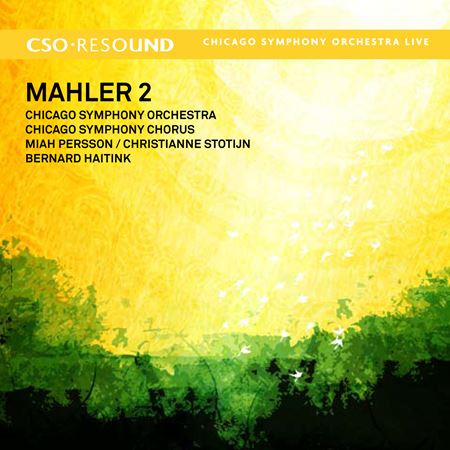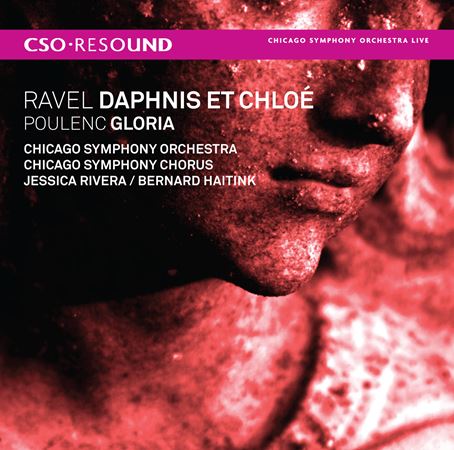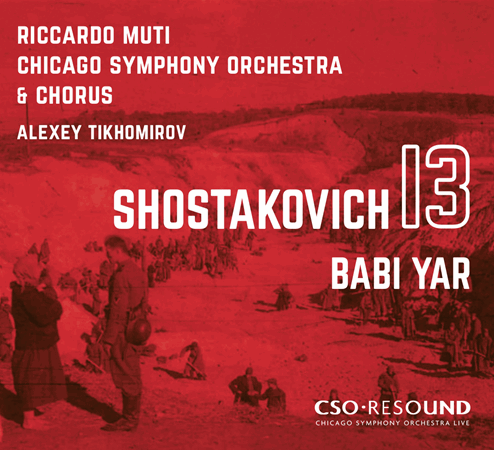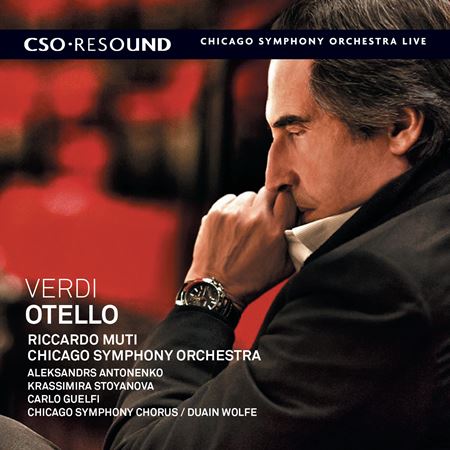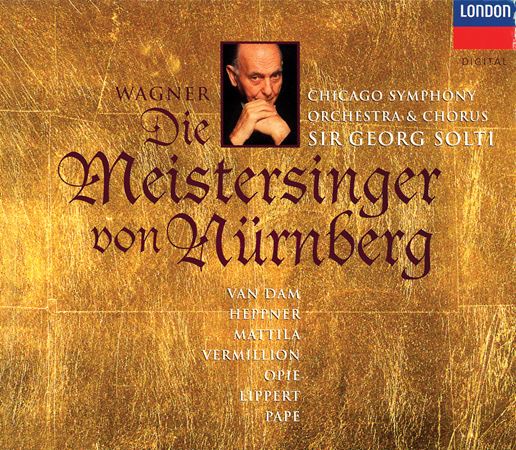Duain Wolfe has served as director of the Chicago Symphony Chorus since 1994.
Todd Rosenberg Photography
The Chicago Symphony Orchestra’s commercial recording legacy began on May 1, 1916, when second music director Frederick Stock led the Wedding March from Mendelssohn’s A Midsummer Night’s Dream for the Columbia Graphophone Company. The Orchestra has since amassed an extraordinary, award-winning discography on a number of labels — including Angel, CBS, Deutsche Grammophon, Erato, London/Decca, RCA, Sony, Teldec, Victor and others — continuing with releases on the in-house label CSO Resound under tenth music director Riccardo Muti. For My Favorite CSO, we asked members of the Chicago Symphony family for their favorite recordings (and a few honorable mentions) from the Orchestra’s discography.
Since 1994, Duain Wolfe has served as director of the Chicago Symphony Chorus, preparing the ensemble for over 150 programs for concerts in Orchestra Hall and at the Ravinia Festival, as well as many works for commercial recordings. Winner of two Grammy awards in 2010 (Best Choral Performance and Best Classical Album) for the Chicago Symphony Orchestra’s recording of Verdi’s Requiem with Riccardo Muti, in 2012 Wolfe received the Michael Korn Founders Award from Chorus America in recognition of his contributions to the professional choral arts. His activities also have earned him an honorary doctorate, the Bonfils Stanton Award in the Arts and Humanities and the Colorado Governor’s Award for Excellence in the Arts.
“There are dozens of recordings by the Chicago Symphony Orchestra that I cherish and have long made a part of my musical life. As retiring director of the Chicago Symphony Chorus, however, I want to share my proudest experiences with our remarkable Chorus as it participated in the recordings of the CSO — personal experiences with the Chorus, Orchestra and maestros that have brought me particular joy during my 28-year tenure — golden years that have formed the core of my life in music.”
MAHLER Symphony No. 2 in C Minor (Resurrection)
Recorded in Orchestra Hall in 2008 for CSO Resound
Bernard Haitink conductor
Miah Persson soprano
Christianne Stotjin mezzo-soprano
Chicago Symphony Chorus
Duain Wolfe director
"This monumental piece appears on our performing schedule more frequently than one might expect, given its enormous forces and its sheer length. But as far as I’m concerned, it is such a great tour de force that it could appear twice as frequently and I would be very happy. Our Chorus sings the exquisitely soft a cappella entrance (’Aufersteh’n, ja aufersteh’n’ / ’Rise again, yes, you shall rise again’) with a rich, warm wealth of color, so beautifully controlled by Maestro Haitink. He later extends that control to the overwhelming fortissimos at the end (’Wirst du, mein Herz, in einem Nu!’ / ’Will you, my heart, in the twinkling of an eye!’), encouraging the Chorus to sing at full tilt while still maintaining the beauty of the opening. A remarkable feat, indeed."
POULENC Gloria and RAVEL Daphnis and Chloe
Recorded in Orchestra Hall in 2007 for CSO Resound
Bernard Haitink conductor
Jessica Rivera soprano
Chicago Symphony Chorus
Duain Wolfe director
“Two of my favorite pieces on the same disc. Life is good. Poulenc’s barely reverent Gloria is complemented by Maestro Haitink’s delightful sense of humor. The Orchestra and Chorus create a clever and perky dialogue in the ’Laudamus te’ (’We praise you’) while still respecting the grand, glorious finale, ’Qui sedes ad dexteram Patris’ (’Who sits at the right hand of the Father’). The beauty of Jessica Rivera’s liquid and supple voice is simply breathtaking. She owns this piece.
"Why would I love so much a work like Ravel’s great ballet Daphnis and Chloe when there aren’t even any words for the Chorus to sing? After all, Ravel put a simple ’a’ at the beginning of the score, and that’s the sum total of guidance to the Chorus about what kinds of sounds it should produce. I have always taken that ’a’ (which can be pronounced many different ways) as a challenge for generating vocal sounds that complement the orchestral sounds. After all, the primary function of the Chorus in this piece is to be an integral and colorful expansion of the orchestra’s tonal world. Maestro Haitink allowed me to determine the color of that ’a’ at every texture change throughout the piece. It was a special and extraordinary collaboration."
SHOSTAKOVICH Symphony No. 13 in B-flat Minor, Op. 114 (Babi Yar)
Recorded in Orchestra Hall in 2018 for CSO Resound
Riccardo Muti conductor
Alexey Tikhomirov bass
Men of the Chicago Symphony Chorus
Duain Wolfe director
2020 Grammy Award for Best Engineered Recording–Classical
"Devastating. The poems by Yevgeny Yevtushenko recounting the horrors of Babi Yar and the destitution of Soviet life, poverty and fear are simply devastating. Maestro Muti brought Shostakovich’s profoundly moving — and disturbing — settings of these poems to the attention of the European musical community in 1970.
“Performing and recording this powerful symphony with him was an experience which none of us who were involved will ever forget. The men of the Chicago Symphony Chorus brought their rich, somber voices to these poems, coloring them with a timbre that furthered the vision of both Yevtushenko and Shostakovich. My heart would beat a little louder with every rehearsal, every performance, every contact with this moving piece.”
VERDI Otello
Recorded in Orchestra Hall in 2012 for CSO Resound
Riccardo Muti conductor
Krassimira Stoyanova soprano
Barbara Di Castri mezzo-soprano
Aleksandrs Antonenko, Juan Francisco Gatell and Michael Spyres tenors
Carlo Guelfi baritone
Eric Owens bass-baritone
Paolo Battaglia and David Govertsen basses
Chicago Symphony Chorus
Duain Wolfe director
Chicago Children’s Choir
Josephine Lee director
“My first opera experience with the renowned interpreter of Verdi, Riccardo Muti. The moment that opening storm scene churns the violent waters of the sea grabs me and presses me into the tangled genius of Verdi’s singular sense of drama. Every rehearsal was an exploration of the notes and words that made this scene so electrifying. The Chorus, Orchestra, soloists and maestro found the essence of that storm and magnified it tenfold, setting the stage for the remainder of this gripping yet beautiful opera.”
WAGNER Die Meistersinger von Nürnberg
Recorded in Orchestra Hall in 1995 for London
Sir Georg Solti conductor
Karita Mattila soprano
Iris Vermillion mezzo-soprano
Ben Heppner, Herbert Lippert, Roberto Saccà, John Horton Murray and Steven Tharp tenors
Alan Opie, Gary Martin and Richard Byrne baritones
José van Dam, Albert Dohmen, Kevin Deas, Stephen Morscheck and Kelly Anderson bass-baritones
René Pape bass
Chicago Symphony Chorus
Duain Wolfe director
1997 Grammy Award for Best Opera Recording
"Sir Georg’s last Meistersinger. And I was honored to be there. What a project. What a responsibility.
"He told us all (Orchestra, Chorus, soloists) that we should give this colossus the intimacy of chamber music, with every note and nuance contributing to a tightly woven musical fabric. That is what he projected with his venerable musical leadership. I marvel at the close-knit ensembles of the massive cast — the clarity and the beauty. But I also respect (and am grateful for) the clarity that he brought to the great choral scenes, especially the formidable fugal fight scene (act 2, scene 7), and the great apotheosis, (’Wach auf!’ / ’Wake up!’). I listen each time with renewed awe at the genius of all the performing forces involved, especially Sir Georg Solti."
A few honorable mentions:
- VERDI Messa da Requiem with Riccardo Muti for CSO Resound (2009)
- STRAVINSKY Pulcinella with Pierre Boulez for CSO Resound (2009)
- SCHOENBERG Kol nidre with Riccardo Muti for CSO Resound (2012)
- BERLIOZ The Damnation of Faust with Sir Georg Solti for London (1989) (video)
- BERLIOZ Les nuits d’été with Leontyne Price and Fritz Reiner for RCA (1963)
- BORODIN Polovetzian Dances from Prince Igor with Daniel Barenboim for Deutsche Grammophon (1977)
- BRAHMS A German Requiem with Daniel Barenboim for Erato (1992)
MFC-041
